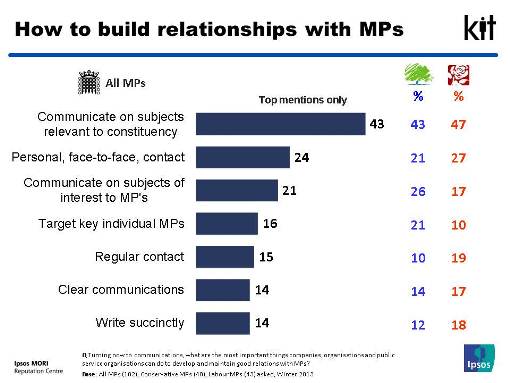Communicating with MPs: Build the relationship

Being a professional communicator in and around Westminster and the British political system can be a challenge, and those of us entering this world for the first time can be forgiven for thinking that communicating with MPs should be simpler than it is. There are only 650 of them for a start, and they tend to hold their position many years and spend all of their time in same square, half-mile of London all week. Surely, the inexperienced communicator may ask, a targeted campaign could get through to all of them quickly and easily?
Alas, nothing is that simple and actually getting across a specific message to MPs can be exceedingly difficult. My career so far has been spent talking to MPs on behalf of Government and/or Public Affairs teams of major companies and organisations to try and work out whether MPs are listening to their communications, and how much of their message is actually getting across. Unfortunately, sometimes my findings show that communication campaigns are failing to achieve the required penetration and that MPs still hold the opinions that my clients have spent time and money trying to change.
However, one of the virtues of conducting research amongst MPs as regularly as Ipsos does is our ability to ask MPs upfront how companies should be maintaining good relations with MPs – so we do, and have done for many years now. The most recent set of results are as follows:

Clearly the main lesson from this is to remember that MPs are, first and foremost, elected to represent a specific part of the country and many of them spend large amounts of their time dealing with the issues arising from that area and its population. It therefore makes sense that two fifths of MPs say that the best way to develop and maintain relations with them is to talk to them about issues that are relevant to the people they represent. On this point at least, both Conservative and Labour MPs are in close agreement.
Following on from this is the fact that a fifth of MPs overall, and nearly a quarter of Tories, want to receive communications that are of interest to them personally. In many ways this is common sense, but having seen the mailing lists produced by some companies, it is clear that it needs reiterating. There is little point in sending a mail-out concerning flood prevention on the river Severn, however well-crafted and carefully worded, to an inner-city MP from Newcastle who sits on five different disease and medicine All-Party Groups and spends time campaigning to keep a local hospital open. An extreme example, but such variations in subject interest are all too common, and are all too commonly ignored by Government Affairs teams in a hurry.
But once you have selected the MPs to target, how do you actually communicate with them? Again, this is a complex issue and, while MPs do express their preferences in this respect, there is no definite answer. Crucially however, a fifth of Conservative MPs and nearly a third of Labour MPs say that maintain personal contact and face to face meetings are important when trying to build or maintain a relationship with an MP. The personal touch is always more effective when it comes to trying to put across your ideas, and this is as true in Westminster as it is elsewhere.
When it comes to written communications the two main political parties differ slightly in their preferences. Conservative MPs ask for their communications to be both targeted and bespoke, a thinly veiled rejection of mass mailing and an endorsement of a more personalised approach. Labour MPs on the other hand are less bothered about bespoke or targeted communications, instead expressing a wish for communications to be regular, clear and succinct.
So what does this mean for companies and organisations trying to build a relationship with MPs through a dedicated communications plan? Well, the first step is to remember is that unless you are genuinely a company that is strategically or financially vital for the ongoing safety and preservation of the UK and/or its economy, you are better off targeting a smaller group of MPs than the House as a whole. Your targets should be MPs who are either actively interested in the sector you represent, sit on a committee (Select or All-Party) that is relevant or represent a constituency that hosts a facility (or anything else which employs a reasonable number of people) owned by you or a competitor in your sector. MPs need a reason to agree to a meeting or to read your communique. So appealing to their personal and professional interests is the best place to start.
Next week: Part 2: What MPs read and watch, and why that is important
Ipsos’s MPs survey runs twice annually, interviewing a representative sample of c.100 MPs from the UK House of Commons. Interviews are conducted face-to-face.



